Related Research Articles
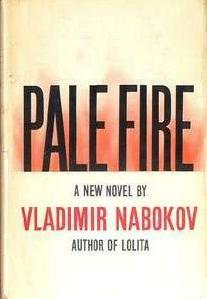
Pale Fire is a 1962 novel by Vladimir Nabokov. The novel is presented as a 999-line poem titled "Pale Fire", written by the fictional poet John Shade, with a foreword, lengthy commentary and index written by Shade's neighbor and academic colleague, Charles Kinbote. Together these elements form a narrative in which both fictional authors are central characters. Nabokov wrote Pale Fire in 1960–61, after the success of Lolita had made him financially independent, allowing him to retire from teaching and return to Europe. Nabokov began writing the novel in Nice and completed it in Montreux, Switzerland.
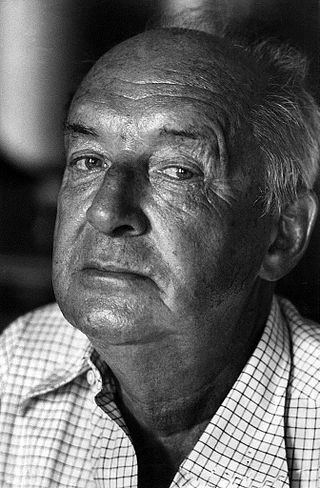
Vladimir Vladimirovich Nabokov, also known by the pen name Vladimir Sirin, was a Russian-American novelist, poet, translator, and entomologist. Born in Imperial Russia in 1899, Nabokov wrote his first nine novels in Russian (1926–1938) while living in Berlin, where he met his wife. He achieved international acclaim and prominence after moving to the United States, where he began writing in English. Nabokov became an American citizen in 1945 and lived mostly on the East Coast before returning to Europe in 1961, where he settled in Montreux, Switzerland.
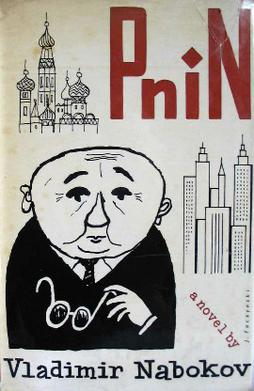
Pnin is Vladimir Nabokov's 13th novel and his fourth written in English; it was published in 1957. The success of Pnin in the United States launched Nabokov's career into literary prominence. Its eponymous protagonist, Timofey Pavlovich Pnin, is a Russian-born assistant professor in his 50s living in the United States, whose character is believed to be based partially on the life of both Nabokov's colleague Marc Szeftel as well as on Nabokov himself. Exiled by the Russian Revolution and what he calls the "Hitler war", Pnin teaches Russian at the fictional Waindell College, loosely inspired by Cornell University and Wellesley College—places where Nabokov himself taught.
Ada or Ardor: A Family Chronicle is a novel by Vladimir Nabokov published in 1969.

The Gift is Vladimir Nabokov's final Russian novel, and is considered to be his farewell to the world he was leaving behind. Nabokov wrote it between 1935 and 1937 while living in Berlin, and it was published in serial form under his pen name, Vladimir Sirin.

The Original of Laura is an incomplete novel by Vladimir Nabokov, which he was writing at the time of his death in 1977. It was published by Nabokov's son Dmitri Nabokov in 2009, despite the author's request that the work be destroyed upon his death.

Novel with Cocaine is a novel first published in 1934 in a Russian émigré literary magazine Chisla (Numbers) under a pen name M. Ageyev. The English translation of the title fails to convey the double meaning of the Russian "Роман," meaning both "novel" and "romance".

Despair is the seventh novel by Vladimir Nabokov, originally published in Russian, serially in the politicized literary journal Sovremennye zapiski during 1934. It was then published as a book in 1936, and translated to English by the author in 1937. Most copies of the 1937 English edition were destroyed by German bombs during World War II; only a few copies remain. Nabokov published a second English translation in 1965; this is now the only English translation in print.
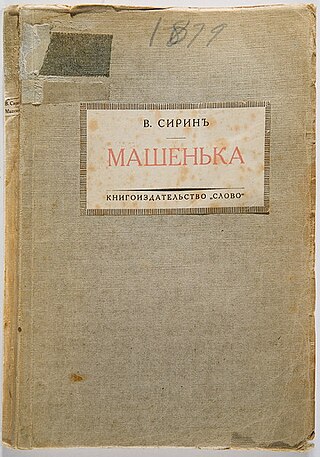
Mary is the debut novel by Vladimir Nabokov, first published under the pen name V. Sirin in 1926 by Russian-language publisher "Slovo".
"Signs and Symbols" is a short story by Vladimir Nabokov, written in English and first published, May 15, 1948 in The New Yorker and then in Nabokov's Dozen.

The Defense is the third novel written by Vladimir Nabokov after he had immigrated to Berlin. It was first published in Russian 1930 and later in English in 1964.
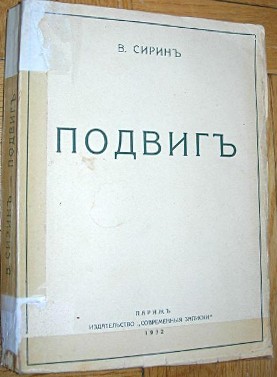
Glory is a Russian novel written by Vladimir Nabokov between 1930 and 1932 and first published in Paris.
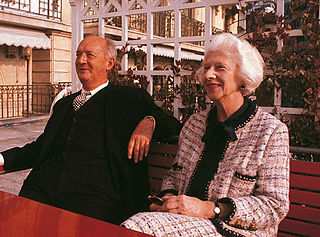
Véra Yevseyevna Nabokova was the wife, editor, and translator of Russian writer Vladimir Nabokov, and a source of inspiration for many of his works.
"Lips to Lips" is a short story written in Russian by Vladimir Nabokov in Berlin in or about 1931. It was first published in 1956 as part of the collection Vesna v Fialte. After its translation into English by the author and his son it was first published in Esquire in 1971 and then in the collection A Russian Beauty and Other Stories in 1971.

Lolita is a 1955 novel written by Russian-American novelist Vladimir Nabokov that addresses the controversial subject of hebephilia. The protagonist is a French literature professor who moves to New England and writes under the pseudonym Humbert Humbert. He describes his obsession with a 12-year-old "nymphet", Dolores Haze, whom he kidnaps and sexually abuses after becoming her stepfather. Privately, he calls her "Lolita", the Spanish diminutive for Dolores. The novel was originally written in English, but fear of censorship in the U.S. and Britain led to it being first published in Paris, France, in 1955 by Olympia Press.
"Sounds" is a short story by Russian American author Vladimir Nabokov originally written in Russian in September 1923.
"The Wood-Sprite" is a short story by Vladimir Nabokov, originally published in Russian in 1921. It was his first published story.
"Music" is a short story by Russian American author Vladimir Nabokov originally published in Russian in 1932.
"Orache" is a short story by Russian American author Vladimir Nabokov originally published in Russian in 1932.
"That in Aleppo Once..." is a short story written by Russian-born author Vladimir Nabokov (1899–1977). First published in Atlantic Monthly in 1943, the story takes epistolary form, with an unnamed narrator describing his recollections of himself and his wife's deteriorating relationship while fleeing German occupation during Case Anton. The narrator reveals to his correspondent the likelihood his wife was not real, examining this premise during the account of events.